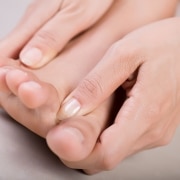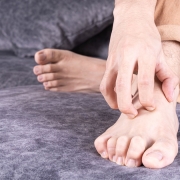OUCH! That Stubbed Toe May Be more Problematic Than You Think
It often happens in the middle of the night, when you’re in a rush, or when you’re not quite watching where you’re going. A stubbed toe can be one of the most painful everyday events, but, thankfully, the pain usually subsides relatively quickly. Nevertheless, there are some instances when a stubbed toe is more than just a painful “stub.” In fact, a hard enough hit can lead to a list of bigger problems. Take a look at just a few of the injuries that can stem from stubbing your toe.
Broken Bones
Believe it or not, broken toes are most often caused by the notorious accidental stub. While the toes in your feet are relatively strong, they do not have a great deal of fatty tissue to protect them. Therefore, hitting your toe directly against something can be enough to cause a fracture. If your toe is broken after you have stubbed it, you will likely know it. The symptoms of a broken toe include:
- Swelling around your toe or up into your foot
- A change in the overall shape of the toe
- Severe pain that gets worse and does not subside
- Difficulty trying to move your toe
Cracked Toenails
Smacking your toe against a hard surface can cause cracks in your toenail, which can be incredibly painful. While cracked toenails are not necessarily a major health threat, this is an issue to keep an eye on. The toenail will not mend back together; you simply have to wait for the broken portion of the nail to grow. If your toenail comes off or is hanging off and you can’t remove it, it is best to see a podiatrist for advice.
Infection
If the hit against your toe causes a wound, your toe can be prone to infection. In some cases, you can get an internal injury you may not spot right away. For example, a hard enough hit could force the edge of your toenail into the interior tissue of your toe. If bacteria are allowed to get inside this kind of injury, it could easily lead to an infection. Your toe may be red or irritated and feel hot to the touch. If you see any of these signs, schedule a visit to your podiatrist for help.
Get Help for Toe Injuries at an Austin Podiatrist
While your toes are one of the smaller parts of your body, these small body parts have some of the biggest responsibilities. If you suspect you have injured your toe after a run-in with a door frame, table leg, or corner, reach out to us at the office of Dr. Jeffery LaMour, DPM, PA in Austin, TX to schedule an appointment.






